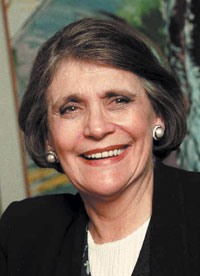


 |
Issue Contents :: Feature :: Opening Eyes:: Page [ 1 2 3 4 5 ]
Controversy about Contraceptives
In 1960, the pharmaceutical company GD Searle received approval for Enovid, the first oral contraceptive. Seaman explains that the "Pill" was and still is made from a combination of two hormones: a synthetic form of estrogen and chemically altered progesterone. With few other options for such an effective means to control their fertility, thousands of women began taking the Pill–but at 10 times the dosage of today's versions. Thousands of women began experiencing side effects, and Seaman's readers deluged her with questions.
"They wrote about all kinds of issues," she recalls: Bloating, weight gain, sex drive. "Some felt guilty because they thought the Pill made them frigid."
 |
Barbara Seaman '56 |
Backlash was swift. Company stakeholders and doctors tried to suppress the book's publication. Under pressure from advertisers, magazine editors one by one fired Seaman. But The Doctor's Case managed to convince then-Senator Gaylord Nelson to hold hearings about Pill safety. Seaman was asked to assist.
Oberlin alumnus Corfman, who was then director of the Center for Population Research at the National Institutes of Health, remembers the hearings. Congress had asked him to testify about the government-sponsored research that was being conducted to determine the safety of the Pill.
As the meeting began, a young feminist in the audience named Alice Wolfson interrupted with a demand to know why no women, including Seaman, were testifying, and why researchers didn't have a birth control pill for men. According to Corfman, security officers responded by clearing the women in the audience from the room.
The meeting went on, but not before Corfman stood up for the protesters: "I said that the people who had interrupted us had something important to say."
The authorities heard them. In the end, FDA regulators required drug makers to include a warning label with the Pill that contained information usually provided for doctors, but in a consumer-friendly language. This was the first time such a patient package insert was demanded for a major drug.
The meeting also marked history in other ways. In 1975, Seaman, Wolfson, and three other activists founded the National Women's Health Network (NWHN). To this day, the advocacy group serves as a clearinghouse that provides women with health information–everything from how to examine one's breasts and cervix to the chemistry of estrogen pills to warnings about taking laxatives while breastfeeding.
"That hearing was a watershed moment in American history," says Cindy Pearson, executive director for the NWHN in Washington, DC. "Women realized that they had the right to know what doctors knew. Barbara was the linchpin of it all."
Next Page >>